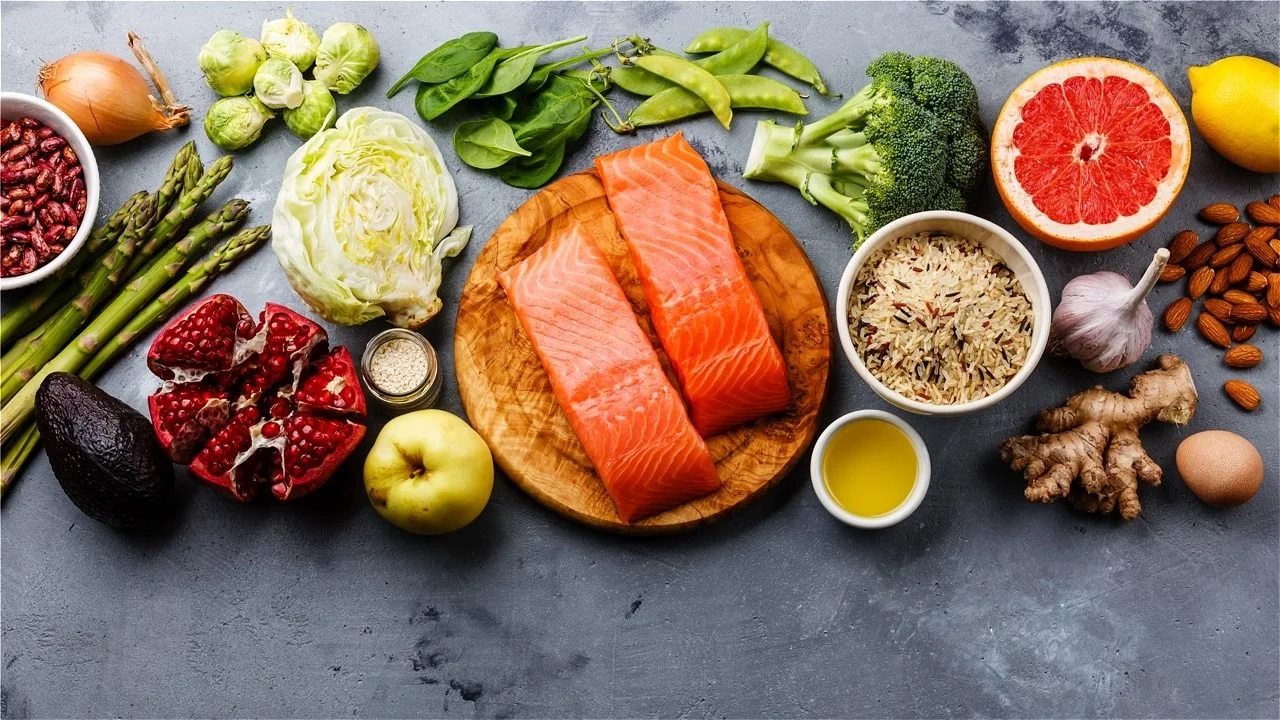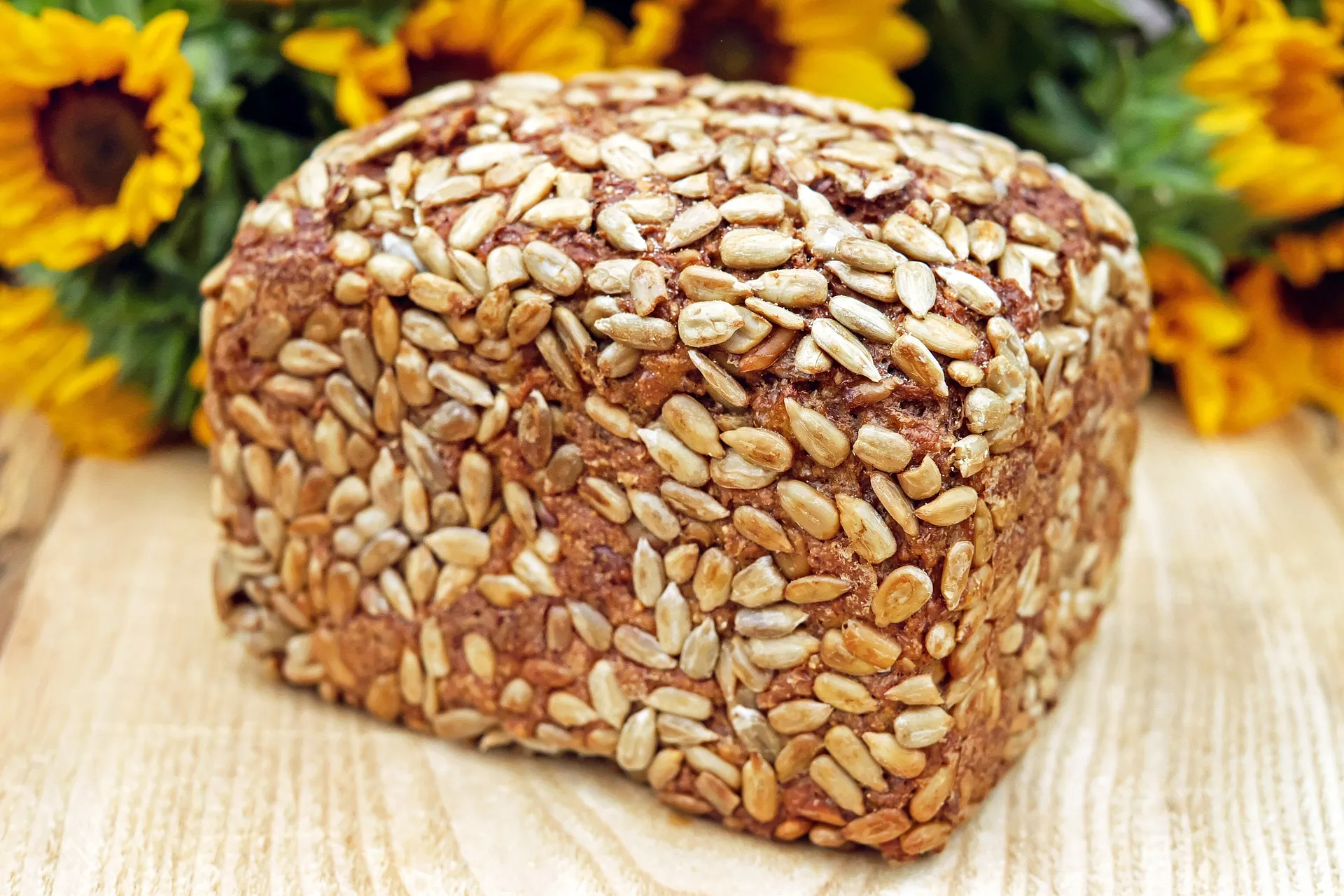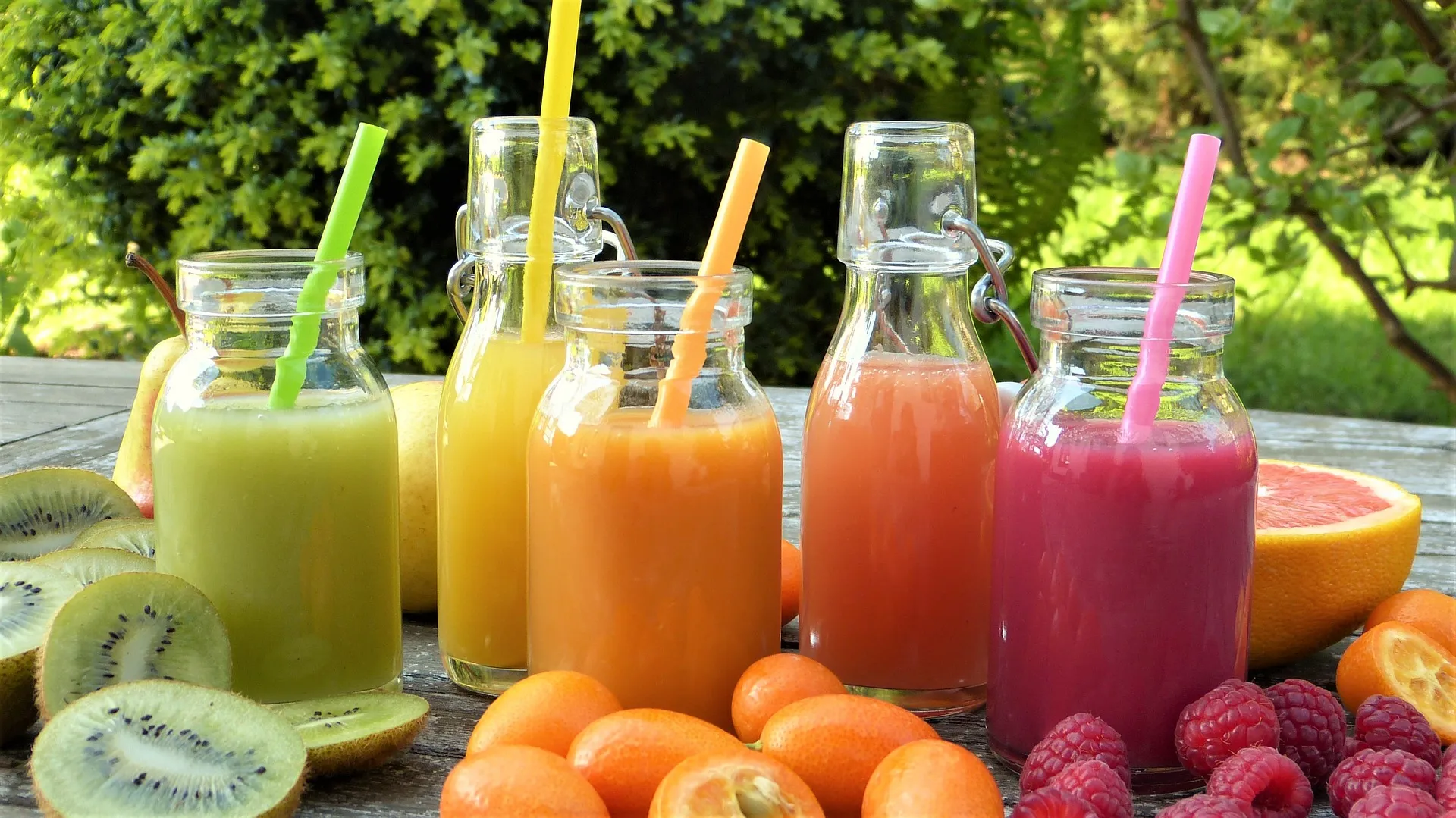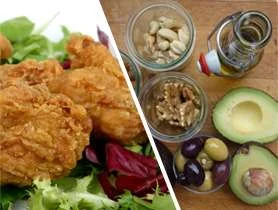
A balanced, varied diet is suitable for the healthy and chronically ill, with slight adjustments. It is not low in calories and is not difficult to perform. The diet emphasizes only natural ingredients, preferably organic, unprocessed, and non-industrialized. The diet is based on a very rich plant-based diet and reduced animal protein, especially those difficult to digest such as meat and processed cheeses. It is important to emphasize that all nutrients, including carbohydrates and starches, are essential, but in the right compositions, not with meat! Natural fats are essential for proper digestion and optimal weight maintenance.
The diversity of diets, supplements, and a wide range of products (primarily industrialized) makes choosing a personal and family diet challenging. This article establishes the principles and guidelines for an optimal diet that can serve most of the population, including chronic patients. (With minor changes)
Introduction to healthy nutrition.
All nutrients are necessary: carbohydrates (including natural sugars and starches), proteins, fats, and oils. Avoiding one of the nutrients creates an imbalance and compensation in one of the other groups. The modern diet is rich in animal protein, which has inflammatory properties and an acidic reaction in the intestines. Natural oils and fats are an essential part of a healthy diet.
The approach of nutritional science today must emphasize not only the nutrient content but also several critical variables:
- Natural food, as opposed to industrialized and processed foods.
- Foods are varied and contain all 3 macronutrients in the right composition, including proteins, carbohydrates, starches, fats, and natural oils.
- Easily digestible foods allow nutrients to be absorbed efficiently. The method of preparation is of great importance.
- Timing of food intake is a vital factor. The main eating must be completed during the daytime or early evening. The night is designed to allow the body to repair tissues.
- Healthy food must contain many dietary fibers, which exist only in plant foods. These fibers allow the restoration of the intestinal walls, rake away all food residues, and feed the probiotic bacteria.
- Probiotics are critical to maintaining a balanced gut flora.
The fundamental requirements of a healthy diet—The balanced-varied diet complies with them all.
This article directly follows the previous article, which dealt with various methodological issues. Is there a health necessity for such a wide variety of diets?
General principles and guidelines:
1. Support tissue rehabilitation, including regular production of neurotransmitters and neurogenesis of the brain's cells.
- Mainly serotonin and dopamine. (To prevent Parkinson's disease) Serotonin has an essential effect on mood.
2 Varied foods, predominantly plant, provide the body with all the nutrients.
- The absorption of nutrients through proper nutrition is always preferable to supplements.
- Diverse foods ensure the body is not deficient in minerals, enzymes, electrolytes, and antioxidants.
3. The body needs only natural, unprocessed, and non-industrialized foods. (Preferably organic and non-genetically engineered)
- Processed and industrialized foods have a far-reaching negative impact on the body and mind.
- Many chronic illnesses result from poor nutrition. In recent decades, large populations worldwide have consumed processed and industrialized foods due to changes in life habits and lack of free time.
4. Avoidance of one of the food macronutrients is a mistake!
- Carbohydrates, natural starches, and sugars are essential for the body. They are not the enemy!
- Filling a plate and feeling full without carbohydrates and starches is challenging. Throughout history, humans have consumed starches as nutritional and satiety foods. (In Asia, rice is consumed; in Europe, potatoes, and in the Americas, corn and other starchy grains)
- The production of vital energy for a body of fats and proteins is possible but at the cost of a heavy load on the kidneys and liver, removing the decomposition products such as ammonia, uric acids, urea, and ketones.
5 Dietary fiber is critical for replenishing the intestinal walls. (Dietary fiber exists only in plant nutrition.)
- Dietary fiber nourishes good bacteria and prevents the uncontrolled proliferation of parasites and other harmful bacteria, which strain the immune system.
- Dietary fiber helps to remove solid waste. Low-fiber nutrition can create chronic constipation with additional side effects.
6 . Fermented natural foods help maintain a balance of gut flora.
- Naturally fermented foods (non-industrialized and without supplements) are essential for maintaining a healthy immune system.
- Examples of fermented foods are yogurt (preferably goat's or sheep's milk), kombucha tea, fermented soy (primarily common in Asia), and sour vegetables (without additives or preservatives in glass jars only).
7. The body needs natural oils and fats.
- Natural and high-quality oils and fats are part of proper nutrition. They are even essential to preventing obesity!
- Oils are required for gut lubrication, and gallbladder excretion of bile fluid neutralizes the acidity of food coming from the stomach.
- Natural oils, including saturated fat (such as ghee butter or coconut oil), are essential for the body and do not damage blood vessels and the heart, as previously thought!
- The most harmful oils are processed solid vegetable oils. (Such as margarine) or recycled or heated oils. (It turns them into Trans fats.)
- Adding suitable natural emulsifiers or small quantities of natural oils and fats, like olive oil, Ghee butter, avocado, and homemade natural sauces. (All-natural sauces are suitable emulsifiers.)
- Lemon, vinegar, olive oil, Ghee, mustard, honey, avocado, and egg yolk are excellent emulsifiers mixed with oils/fats. No wonder sauces are made of them!
8 Since most animal foods we consume are industrialized, reducing their consumption is advisable.
- Today's diet (especially the Western) is affluent in animal protein in a quantity that exceeds the body's needs. The quality of animal food depends mainly on the food the animal has received.
- Animal proteins are hard to digest and produce an acidic environment in the gut, which causes the proliferation of harmful parasites and bacteria in the digestive tract.
- An average cow weighs about 600 kg and produces milk suitable for feeding calves, not humans. Cow's milk is too concentrated in proteins. Goat's milk (less sheep) is similar in composition to breast milk and is much healthier, but its price is very high.
- Deep-water fish (less polluted) and Eggs (preferably organic) are relatively easy foods to digest.
- Fish (especially deep-sea fish) are easy to digest. They contain essential omega-3 fatty acids and do not create a very acidic gut environment.
- Eggs (mainly organic) are an excellent emulsifier (thanks to the lecithin found in the egg yolk) and are nutritious and easy to digest.
9. Are personalized diets more successful than other diets? (The answer is "YES")
- Personalized diets do not contradict "the balanced and varied diet."
- Custom diets consider personal preferences, lifestyle, eating habits, food availability, budget, etc. They are supposed to produce optimization under constraints.
- The main difficulty lies in the lack of uniformity of opinion and unifying nutritional science theory. Experts and different dietitians will have other recommendations, sometimes even significant differences.
Starches and carbs are mistakenly considered fattening and unhealthy.
- Starches are a very satisfying food with high nutritional value, relatively high caloric content, and a relatively high glycemic index (the Speed of breakdown into sugars). However, it is essential to emphasize that the picture that emerges at first sight is a bit misleading.
- For thousands of years, starches, including rice, corn, potatoes, sweet potatoes, grains, taro, and cassava, have been eaten worldwide.
- Obesity and chronic diseases such as diabetes, hypertension, coronary heart disease, and more gained momentum mainly in the second half of the 20th century due to the transition to industrialized and processed diets.
It is essential to know that starches are acidic to the digestive system, and therefore, it is not advisable to combine them in large quantities with meat and dairy products. Adding natural fat eases digestion, lubricates the intestines, and prevents acid damage.
The ease of digestion is vital to the absorption of nutrients.
The nutritional values of food and beverages are theoretical, assuming complete absorption, which is usually not the case in the modern diet.
- The intestinal walls of most adults in the modern, highly industrialized diet do not look like in the picture. Unbalanced intestinal flora creates an acidic intestinal environment, damaging the intestinal walls. When the contact area of the intestinal walls decreases, the absorption of nutrients also decreases significantly.
What kinds of foods are difficult to digest?
- The body identifies industrialized and processed foods and beverages, especially those containing synthetic substances, as foreign substances.
- Animal protein, especially meat and hard cheeses, is acidic to the intestines and difficult to digest.
- Smoked food.
- Extremely dry.
- Sugary drinks, including diet drinks with artificial substances.
- Uncooked food is more difficult to digest than cooked food. (The cooking process causes a loss of nutritional values but facilitates digestion.)
How can you improve the digestion of different kinds of foods?
- Fatty foods are easier to digest. (provided it is fat or natural oils)
- Eat a diet rich in dietary fiber. (exist only in plants)
- Add emulsifiers such as lemon, vinegar, honey, avocado, mustard, egg yolk, olive oil, and more to the food.
- Don't eat hard-to-digest foods together. (Such as meat and potatoes)
- Fermented foods help the gut maintain balanced intestinal flora.
- Let your digestive system rest. Few relatively large meals, preferable to small meals frequently.
- Eating habits and food composition are of high importance.
It is essential to know that food routing is critical for tissue regeneration and significantly impacts obesity. Food that is easily digested and easily absorbed is suitable for tissue rehabilitation. On the other hand, hard-to-digest food that is not absorbed will become a much higher percentage of available energy and fat accumulation.
The composition of foods, cooking methods, and eating habits.
The quantities (mainly of animal proteins) and the composition of the foods are significant. A healthy diet must include all nutrients and exceptionally generous amounts of natural plant foods.
1 The composition of foods is of very high importance.
- Oils, natural fats, and natural sauces help digestion. Add them to a variety of dry foods.
- Hard-to-digest foods such as meat and dairy products should be combined with easy-to-digest, non-acidic foods for the gut. (Mainly cooked vegetables). Dry food is often difficult to digest, and hard-to-digest foods affect the immune system.
- Minimize consuming cold foods and drinks. Cold foods and beverages are harder to digest and require life energy from the body. (And not just calories)
2. Avoid eating late at night.
- The digestive system must rest at night when the immune system is repairing tissues. Digestion of meat and dairy products usually requires many hours.
- Hard-to-digest foods should be eaten only during the day.
3 The cooking, preparation, and serving methods are of great importance.
- All forms of cooking have advantages and disadvantages. The dish should look significant and satisfying. (We also eat with our eyes.)
The balanced-varied diet can suit everyone (with slight changes), including vegetarians and vegans.
A balanced, varied diet can optimize the body's weight and health in the long run.
- Unprocessed natural food (preferably organic and not genetically modified) contains all macronutrients and ingredients, including reduced quantities of animal protein, preferably grass-fed or organic range-free products. Many dietary fibers are mixed with natural oils and fats, enabling an effective emulsification process. Fermented products with natural live bacteria are essential for good health. Vegetables, fruits, seeds, sprouts, roots, legumes, mushrooms, beans, berries, and nuts should be very high-volume diet components.
The balanced-varied diet is potent anti-inflammatory nutrition.
- "The balanced, varied diet" is potent anti-inflammatory nutrition that can initiate the regeneration of damaged tissue, including the brain (neurogenesis), pancreas beta cells, and all other body organs.
The balanced-varied diet - Introduction. (Includes balance between all macronutrients.)
- Natural fats, proteins, carbohydrates, and sugars are needed; completely denying one of the macronutrients is wrong.
- The need for various foods (mainly from plants) allows the body to get all the nutrients (enzymes, minerals, electrolytes, dietary fiber, and antioxidants) through food and drinks. High-quality and varied foods, combined with sun-controlled exposure, almost eliminate the need for sometimes harmful supplements and absorb less than quality food.
Vegans, in particular, need supplementation of vitamin B12 and omega-three fatty acids.
- Vitamin B12 originates in animals and is essential for many physiological and anti-inflammatory mechanisms.
- Although omega-3 is also present in plants, it is not the same as omega-3 in fish oil. Fish oil has advantages over omega-3 from plants, especially for adults and people with weak livers.
Patients with chronic inflammatory diseases may suffer from severe farting generally and during recovery.
- Imbalances in intestinal flora often manifested themselves in farting. Farting during the recovery period is often a positive sign! (Contrary to what is commonly thought) They reflect attempts by good bacteria to control the parasites. (Dead parasites release gas.)
- Taking control of the good bacteria over the parasites is usually accompanied by much farting. This process can take several months. There is no need to panic and see the recommended diet as if it failed. On the contrary!
Berries, preferably with goat yogurt, are highly recommended.

The balanced-varied diet - Recommended food:
- Start your morning by drinking one cup of squeezed lemon juice with lukewarm water. (It is even better if you add one tablespoon of apple cider vinegar + one tablespoon of olive oil.)
- Vegetables, seeds, sprouts, roots, nuts, legumes, beans, lentils, mushrooms, fruits, and berries.
- Low-medium-glycemic-index starches such as rice, sweet potato, taro root, spelled, and quinoa are good choices. (Add a teaspoon of coconut oil, ghee-purified butter, or other natural oils for better absorption.)
- Eat deep-water fish 2-3 times a week. They are less contaminated and also have high omega-3 and vitamin D3 content.
- Fish is easy to digest and does not create a very acidic environment in the intestines.
- Organic range-free eggs (especially egg yolk) are excellent emulsifiers due to their high lecithin content. (Good quality egg yolk has an orange color.)
- Egg yolk is rich in vitamin D3.
- Berries are among the most potent antioxidants. They are delicious with fruit, goat yogurt, cinnamon, and walnuts. (Yogurt, like all probiotics, may cause gas bloating. It is usually a good sign.)
- The liver, in particular, benefits from all-natural bitter foods. (Such as grapefruit and dark chocolate).
- Dietary fiber (found only in plant-based diets) is essential for gut recovery. It might cause a reaction like gas bloating. (Fiber helps to feed the good bacteria.)
- Fermented products with natural live bacteria, such as goat yogurt or natural kombucha, are essential for good health.
- Consuming high-quality fats like Olive oil, flaxseed oil, hemp oil, Ghee (purified butter), and coconut oil, together with fiber, helps lubricate the lining of the intestinal walls. It is essential for replenishing the good bacteria and helping regenerate intestinal wall tissue.
- Regular eating of bone marrow (possibly in soup) is especially recommended.
- Consuming Iodine regularly is essential for proper thyroid function. (The easiest way is to consume Himalayan pink salt.)
- Consuming foods containing sulfur, such as Himalayan (black) salt, avocado, onion, garlic, broccoli, cabbage, cauliflower, and kale, is recommended to strengthen the immune system.
Dense and heavy bread is much more satisfying.

Which bread is the healthiest?
Eating bread with a fatty spread, such as avocado, natural mayonnaise, tahini, butter, or others, is always advisable. While many bread recipes exist, most people do not bake their bread. Therefore, it is essential to buy bread from a reliable source. The best are small, specialized bakeries that deliver organic, whole-grain sourdough bread.
The primary criteria for healthy bread:
- Only from natural ingredients and unprocessed flours.
- The leavening of the dough with natural yeast (sourdough only)
- Flours that are low in gluten or gluten-free.
- Healthy bread is easy to digest.
Most recommended bread types:
- Sprouted, rye, spelled, or whole flour sourdough bread.
- Sprouted bread is recommended for everyone. Sprouting releases enzymes that break the grain shell, making it much easier to digest. Due to germination, sprouted bread has low gluten and is moist, requiring heating in the toaster.
Light bread and crisps are industrialized foods that are not satisfying or recommended. Also, avoid eating white flour and yeast bread; they disturb the balance of gut flora.
- Low-calorie bread is less dense and weighs less. Heavy bread makes you feel full faster.
- Paradoxically, it also does not lead to weight loss. Light bread is bread that has been significantly puffed. Gluten-rich flour, stabilizers, sugar, and acids are added to the flour to prevent it from falling apart. Although low in calories, light bread is not satisfying and is mainly highly industrialized. The argument that only natural materials are used does not stand the test of reality. Healthy bread is heavy! They are very satisfying and healthier.
Natural, squeezed juice is better than any artificial soft drink.

Recommended Beverages:
- Water, soda (limited quantities, better with lemon), tea (without sugar or milk), black coffee (without sugar or milk)
- Freshly squeezed juice. (Not too sweet.)
- Drinking fresh juice may cause gas bloating. (If it happens, it can signify imbalanced gut flora.)
Food and beverages are not recommended. Minimize consumption.
- All Processed Food, smoked food, preservatives, and canned food. (Huge category.)
- Soft drinks of all kinds, including diet beverages.
- Plain sugars and high glycemic starches. (Such as white flour products, potatoes, white bread, biscuits, cakes, etc.)
- Eating high doses of sweet fruits. (Grapes and watermelon, especially, contain glucose.) Sugars can create an imbalance in gut flora.
- Trans-fats (found in many industrialized products) like margarine are very harmful.
- Yeast bread. (Sourdough bread is much better.)
- Dairy products are unsuitable because they create an acidic environment in the intestines.
- Goat's milk or yogurt is much better. (Limited quantities.)
- High gluten content products. (Gluten protein is found in most cereals. Gluten tends to adhere to intestinal walls and will probably aggravate symptoms.)
- Reduce meat and poultry consumption by 50% or more. (Meat and poultry are hard to digest, creating a high-acidity environment in the intestines.)
- Eating large amounts of carbohydrates and animal proteins is not recommended. (This is especially true for meat or dairy products with potatoes or other high-glycemic starches.)
- Dried foods are tough to digest.
If you usually eat outside, choosing basic dishes cooked on the spot is advisable. (Not fast food preparation)

Recommended eating habits.
It is advisable to eat two main meals a day plus snacks (for those who need them). Dinner should be easy to digest and early, maximum up to 7 in the evening, because most tissue regeneration occurs during sleep. The digestive system needs constant rehabilitation; prolonged breaks between meals are preferable to continuous eating.
- Minimize eating away from home, preferably taking home food to work and not buying outside.
- Prepared food deliveries are a terrible alternative! They contain processed and industrialized food at the most harmful levels.
- Chew well, take a break, and eat comfortably.
- Do not eat late at night.
- Intermittent fasting (not with zero calories) has many benefits.
- Fresh vegetables should be sprinkled with olive oil or other oils such as hemp or flaxseed.
- Add a little fat with a higher melting temperature, such as coconut oil or Ghee butter, boiled or baked starches, or vegetables. (Although they are saturated fats.)
- Especially after a meal that includes animal protein (which is more difficult to digest), a 20-30-minute walk at a moderate speed is recommended. Walking helps the digestive process.
We eat with all our senses, so filling the plate with various vegetables seasoned with oils and spices is desirable. (This includes aromatic salt.)
Each cooking method has its strengths and weaknesses.

Which cooking method is the healthiest?
Pressure cooking is the best and healthiest method.
- Cooking in a pressure cooker saves time and maintains high antioxidant content. The best recipe meets all four criteria. (The taste of food is a question of personal preference.)
- Cooking in a pressure cooker is considered the healthiest because it softens food and greatly facilitates digestion, especially of meats, which are difficult to digest in the first place.
Dry heat Cookery:
- Baking, steaming, grilling, and roasting.
Moist Heat Cookery:
- Boiling, Stewing, And Frying. (Including shallow and deep), Barbequing, Basting.
Healthy cookery criteria:
- Preserve as much of the nutrients as possible.
- Kill pathogens that might reside in the food.
- Enabling ease of chewing and, therefore, ease of digestion.
- Allow toxins to drip from fatty foods, especially meat fat.
Frying has a bad reputation for several reasons:
- Frying requires fats or oils. Many people think they will get fat from eating fried food.
- Saturated fats (like butter and coconut oil) are considered unhealthy.
- Heating oil and fat to high temperatures might hydrogenate them, which is toxic.
Shallow frying (especially if ingredients are cut into small pieces, as in Chinese cuisine) enables speedy cooking while preventing heat damage to nutrients.
Complementary lifestyle recommendations.
- Minimize your medication intake. (It all harms the immune system.)
- Smoking and drinking alcoholic beverages (including beer and wine) are not recommended as they damage the immune system.
- Regular moderate physical exercise. (And massage, if affordable).
- Sound 7-8 hours of night sleep is essential.
Intermittent fasting can reactivate the hunger-satiety mechanism that has disappeared in the modern age of food abundance.
Recommended link: Intermittent fasting has incredible benefits.
- Intermittent fasting is highly recommended for everyone, but especially for chronic patients. Intermittent fasting is an incredible tool for slowing the metabolism. When the digestive system rests, the body can initiate tissue rehabilitation. The benefits of intermittent fasting are far beyond slimming.
What are the two types of intermittent fasting?
- The more familiar and comfortable method is the 16:8 diet, which is only eaten during the daytime. (It is also essential to eat natural and unprocessed food.)
- The second method is fasting for several days intermittently. This method is more challenging to perform.
There is no reason to feel hungry. The balanced-varied diet is not a low-calorie diet.
Link: Organic Recipes.
- Low-calorie diets are hard to follow for a long time; they might create a ketogenic response (like fasting) because the body breaks fats for energy. Digesting proteins for energy produces ammonia and uric acid. Eating starches (in limited quantities) is a must.
- Those interested in losing weight should consider adopting a healthier lifestyle, which inevitably results in optimal weight. If you are interested in a "simple diet" without lifestyle changes, although they are required, you should consider that the result will probably be short-term.
Investing in healthy food and beverages with fresh, unprocessed, natural ingredients involves considerable expense but is the best investment.
Recommended link: Forum discussions about nutrition and eating habits.
Quality, varied, natural food is tasty and contributes to maintaining good health, optimal weight, and a younger look.

The diversity of diets, supplements, and a wide range of products (primarily industrialized) makes choosing a personal and family diet challenging. Consistently, people think they are eating healthy food. On closer inspection, it turns out that this is not the case!

